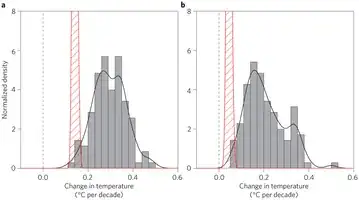The simple answer to this question is yes.
But the debate has been significantly obscured because the majority of contributors to it have chosen what appear to be poor ways of testing the claim with actual data (which is not, in principle, hard as the key data from models and observations are accessible).
Climate skeptics have used time series plots to compare models to observations but these are beset by bad choices of the normalisations for temperature anomalies and are a poor way to compare the underlying patterns due to the noisy nature of temperature time series.
See the claims Spencer makes here WattUpWithThat and a good critique of the errors here.
But there are ways of simplifying the comparison that don't suffer from these defects and these have been done by people who don't seem to have the same partisan desire to reach a particular conclusion.
This picture from a Nature article is the clearest analysis that avoids the various obfuscations possible when looking at noisy time series data:

The choice made by these authors is to compare just the average extent of warming over a period rather than the noisy time series. This appears to avoid some of the choices that make the time series comparison so obfuscating and controversial. Their result seems to show that most models really do overestimate the actual amount of warming over recent years. In their words:
Recent observed global warming is significantly less than that simulated by climate models.
In somewhat more detail the authors talk about the statistics like this (my highlights):
The evidence, therefore, indicates that the current generation of climate models (when run as a group, with the CMIP5 prescribed forcings) do not reproduce the observed global warming over the past 20 years, or the slowdown in global warming over the past fifteen years. This interpretation is supported by statistical tests of the null hypothesis that the observed and model mean trends are equal, assuming that either: (1) the models are exchangeable with each other (that is, the ‘truth plus error’ view); or (2) the models are exchangeable with each other and with the observations (see Supplementary Information). Differences between observed and simulated 20-year trends have p values (Supplementary Information) that drop to close to zero by 1993–2012 under assumption (1) and to 0.04 under assumption (2) (Fig. 2c). Here we note that the smaller the p value is, the stronger the evidence against the null hypothesis. On this basis, the rarity of the 1993–2012 trend difference under assumption (1) is obvious. Under assumption (2), this implies that such an inconsistency is only expected to occur by chance once in 500 years, if 20-year periods are considered statistically independent. Similar results apply to trends for 1998–2012. In conclusion, we reject the null hypothesis that the observed and model mean trends are equal.
